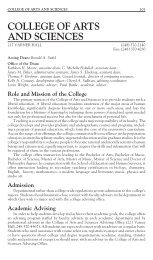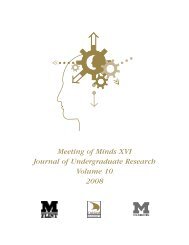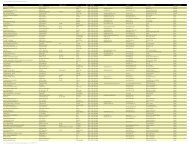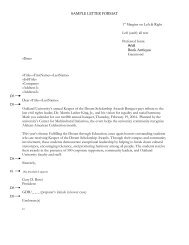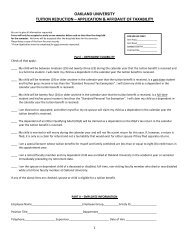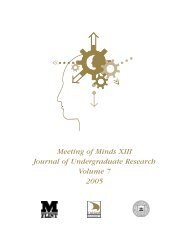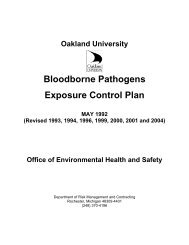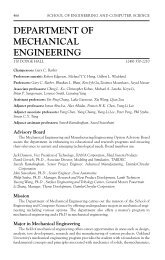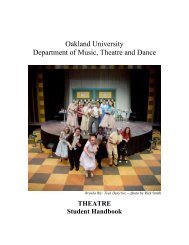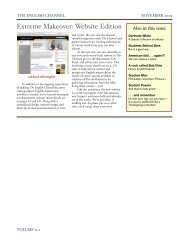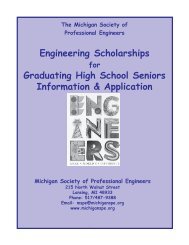MOM 2006 journal for pdf.pmd - University of Michigan-Flint
MOM 2006 journal for pdf.pmd - University of Michigan-Flint
MOM 2006 journal for pdf.pmd - University of Michigan-Flint
You also want an ePaper? Increase the reach of your titles
YUMPU automatically turns print PDFs into web optimized ePapers that Google loves.
ADULT AGE DIFFERENCES IN LETTER AND CATEGORY FLUENCY:<br />
NEUROANATOMICAL IMPLICATIONS<br />
Carissa Broadbridge and Rebecca Anders<br />
Faculty Sponsor: Debra McGinnis<br />
Department <strong>of</strong> Psychology, Oakland <strong>University</strong><br />
Abstract<br />
People <strong>of</strong> all ages tend to generate more words when presented with a category (category<br />
fluency) than when presented with the initial letter (letter fluency). The present study (N=128)<br />
reveals age-related declines in category fluency, F (2, 125) = 10.197, p < .001 with old-old adults<br />
per<strong>for</strong>ming worse than the other age groups. In contrast, letter fluency was associated with<br />
stability across the life span. This age-related category-letter dissociation may be due to the agerelated<br />
declines in brain areas recruited across recall tasks with left temporal activity associated<br />
with category recall and left frontal activity with letter recall (Capitani, Laiacona, & Basso,<br />
1998). This study augments the cognitive aging literature by including a sizable sample <strong>of</strong> adults<br />
older than 75.<br />
Background<br />
Cognitive Aging and the Fourth Age<br />
Virtually all cognitive processes are subject to the negative consequences <strong>of</strong> human aging<br />
(Backman, Small, Wahlin, & Larsson, 2000). Recent studies <strong>of</strong> adults after the age <strong>of</strong> 75 suggest<br />
that the rate <strong>of</strong> decline may increase after that age. Baltes (1997) refers to this part <strong>of</strong> the life<br />
span as the fourth age, with his data suggesting that this is a time when cognitive declines can be<br />
precipitous in a noticeable proportion <strong>of</strong> older adults.<br />
Category and Letter Fluency<br />
Semantic memory is among those processes consistent with a rate change in late life, with no<br />
or minimal decline be<strong>for</strong>e 75, after which deterioration is gradual in most individuals (Backman<br />
et al., 2000). Ability to recall in<strong>for</strong>mation is <strong>of</strong>ten tested through verbal fluency. Among all age<br />
groups, there is a lower rate <strong>of</strong> recall in letter fluency tasks than in category fluency tasks<br />
(Rodriguez-Aranda, 2003; Brickman, Paul, Cohen, Williams, MacGregor, Jefferson, Tate,<br />
Gunstad, & Gordon, 2005). In addition to this, while letter fluency may remain relatively stable<br />
over the lifetime, category fluency tends to decline as age increases (Rodriguez-Aranda, 2003;<br />
Brickman et al., 2005).<br />
Frontal Lobe Hypothesis<br />
Some cognitive aging scientists propose that the frontal lobes may be associated with<br />
significant age-related deterioration, affecting processes dependent on these neuroanatomical<br />
areas (Woodruff-Pak, 1997; Kaszniak & Newman, 2000). Because letter fluency is among the<br />
processes dependent on frontal lobe integrity (Lezak, 1995), age-related changes to the frontal<br />
lobe may result in letter fluency declines in affected individuals. This dissociation implies that<br />
age-related degenerative processes may result in greater declines in frontal lobe processes, such<br />
as letter fluency, compared to temporal processes, such as category fluency.<br />
Meeting <strong>of</strong> Minds <strong>2006</strong> 18



